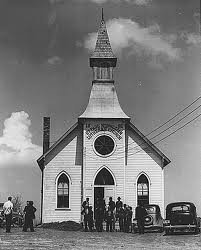
Previous to South Carolina County and city governments compiled vital records, many people recorded significant times, events, and names in their family Bible. Family Bibles are helpful research resources. Even though the dates can’t be guaranteed, Family Bibles are a tangible link with past generations.
Since South Carolina did not record vital records statewide early on in its history, vital records from various churches that existed in the state’s early days are very important, especially from a genealogical research standpoint. Beginning in 1706, the Church of England was declared the official church supported by the state. It was later renamed the Protestant Episcopal Church. It recorded not only birth and burials, but also marriages and christenings. From 1706 to 1778, there were 25 parishes founded across the state. Two of them were established for the Huguenots, who used a Book of Common Prayer in French. Each of the parish registers that still exists has been published, many in multiple forms, including books and appearances in the South Carolina Historical and Genealogical Magazine. The Dalcho Historical Society, Episcopal Diocese of South Carolina also has some of the extant Protestant Episcopal Church records on file.
In the early 1700s, Quakers first settled in South Carolina. They were joined by Irish immigrants in the 1750s. Then, from 1760 onward, other groups of Quakers joined them from Virginia, North Carolina, New York, Pennsylvania, and New Jersey.
In 1685, land grants were issued along the shoreline of South Carolina. That brought French Huguenots, who built permanent settlements in the area. Unfortunately, many of the the Huguenots’ records have been lost, but some do exist. They can be found in Transactions of the Huguenot Society of South Carolina, (1888- present).
In the early 1700s, Presbyterians first came to South Carolina. Later, they were affiliated with the Reformed Presbyterian Church. For more information on those records, contact Presbyterian College Library, Due West, SC 29325, or the Historical Foundation of the Presbyterian and Reformed Churches.
During the 1700s, Lutherans also came to South Carolina. They were primarily immigrants from Switzerland and Germany. Many of the early Evangelical Lutheran records are still extant. They can be obtained through the Lutheran Theological Seminary Library.
1789 was the year that the first Roman Catholic church in South Carolina was founded. It was built at Charleston. Those vital records, including births, deaths, and marriages, have been carefully preserved and can be obtained from the Charleston Diocesan Archives.
The largest religious group in South Carolina today is the Baptists. However, the Baptist Church was not established in South Carolina until 1783. For information on Baptist records, researchers should contact the South Carolina Baptist Historical Collection, James B. Duke Library, Poinsett Highway, Furman University, Greenville, SC 29613. The Journal of the South Carolina Baptist Historical Society, 3 (1977): 32-43 has a list of the church records that can be found at the James B. Duke Library.
1783 was also about the time that the first Methodists settled in South Carolina. Membership lists, conference records, biographical information, and historical information were all kept by the Methodist Church. Those records can be obtained from the South Carolina Methodist Conference Archives, Sandor Teszler Library, Wofford College. Some Methodist records can also be found at the University of South Carolina’s South Caroliniana Library in Columbia.
South Carolina Church and Bible Links
- South Carolina Baptist Marriages and Deaths, 1835-65
- Reformed Presbyterian Marriages and Deaths, 1866-88
- Reformed Presbyterian Marriages and Deaths, 1843-63
- History of the German settlements and of the Lutheran Church in North and South Carolina.
- Maryland and South Carolina Lutheran Newspapers, Marriages and Deaths
- Richard N. Cote, “South Carolina Religious Records: Other Denominations,” South Carolina Historical Magazine 86 (January 1985): 50-61. Cote’s article discusses records of the following religious groups: African Methodist Episcopal Church; Congregational; Unitarian and Universalist Churches; the Christian Church (Disciples of Christ); French Protestant (Huguenot) Church; Jews; Lutheran Church; Roman Catholic Church; and Society of Friends (Quakers).
- Margaretta, Leland, and Isabella G. Childs, “South Carolina Episcopal Church Records,” South Carolina Historical Magazine 84 (October 1983): 250-63.
- William F. Medlin, Quaker Families of South Carolina and Georgia (N.p.: Ben Franklin Press, 1982). South Carolina Quaker records are included in William Wade Hinshaw, ed., Encyclopedia of American Quaker Genealogy, vol. 1 (1936; reprint, Baltimore: Genealogical Publishing Co., 1994).
- Inventory of the Church Archives of South Carolina Presbyterian Churches: 1969 Arrangement with Indexes (South Carolina Historical Records Survey, Works Progress Administration, 1969).
- Richard N. Cote, “South Carolina Religious Records: Presbyterian Records,” South Carolina Historical Magazine 85 (April 1984): 145-52.
- J. Glenn Clayton, “South Carolina Baptist Records,” South Carolina Historical Magazine 85 (October 1984): 319-27.
- South Carolina Baptist Deaths and Marriages, 1866-87
- South Carolina, Births and Christenings, 1846-1935
- Old South Carolina churches
- South Carolina Church Books (amazon.com)
Before South Carolina County and city governments collected vital records, many people recorded important dates, events, and names in their family Bible. Family Bibles are valuable research tools. Although the dates cannot be guaranteed, Family Bibles are a tangible link with past generations.
- South Carolina Bible Books (amazon.com)
